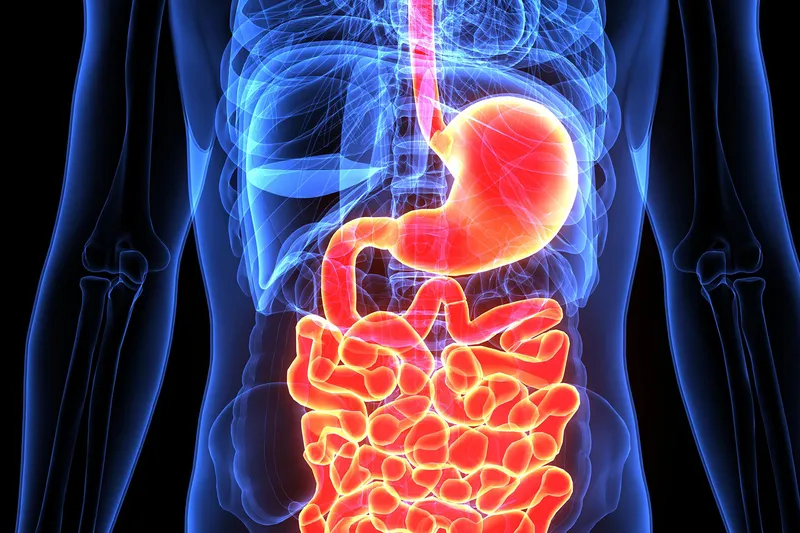
Irritable bowel syndrome (IBS) is a chronic gastrointestinal condition that affects as many as 15% of adults living in the United States. It’s marked by a variety of symptoms including abdominal pain, diarrhea or constipation, gas, and bloating. Kate Scarlata, MPH, RDN is a registered dietitian nutritionist and author with more than 30 years of experience working with IBS and other digestive disorders. She wrote her latest book, Mind Your Gut: The Science-Based, Whole-Body Guide to Living Well with IBS, with Megan Riehl, PsyD, a psychologist specializing in gastrointestinal disorders. I talked with her about IBS and her latest book. Here are some key takeaways from our conversation:
What causes IBS?
The exact cause of IBS is unknown, but factors such as abnormal intestinal movements, changes in the microbes that live in the colon, genetics, intestinal infections, and adverse childhood events such as trauma or sexual abuse increase IBS risk. Irritable bowel syndrome runs in families, and this is especially true for women and their children. Gastroenteritis, which is the inflammation of the stomach and gut lining that’s caused by a virus or bacteria, can result in IBS. Younger people, women, and those with severe symptoms of gastroenteritis are more likely to develop IBS after having an intestinal infection. Antibiotic use is associated with IBS, too.
How has the thinking about IBS changed over the years?
In the 1950s, IBS was thought to be a psychosomatic disorder. We now know that IBS is a complex condition that results from a combination of factors, including how the gut and brain communicate with each other. Your gut and brain are constantly sending signals to each other that influence how the gut moves, your mood, appetite, and behaviors. Changes in the community of beneficial bacteria that live in the gut, which also help protect the gut barrier, can affect this cross-talk. Gastrointestinal motility issues are also a factor in IBS. Motility disorders result when the nerves or muscles in the gut don’t function in a coordinated manner, resulting in constipation, diarrhea, and other issues. A lower threshold for pain in your internal organs, known as visceral hypersensitivity, also plays a role in IBS.
What are the treatment options for IBS?
Treating IBS has evolved from a doctor-only approach to a multi-disciplinary team approach that includes a GI (gastrointestinal) dietitian, GI psychologist, and a gastroenterologist (an MD). Evidence shows that using a team approach works best. Integrated care that addresses gastrointestinal symptoms with nutrition and brain-gut behavior therapies is considered the gold standard. This is especially the case because up to one-third of people living with IBS experience anxiety or depression.
Some people have bloating, while others have diarrhea or constipation, and treatment should be tailored to the individual. Medications that manage pain, diarrhea, or constipation are useful. Therapies that target the gut, including gut-directed hypnosis, cognitive behavioral therapy, mindfulness, and breathing techniques are also helpful. Nutrition also plays a big role in IBS symptom management.
How does nutrition affect IBS?
Years ago, patients with IBS were told to simply eat more fiber. But we now know that some fibers, particularly FODMAP fibers, can trigger IBS symptoms. FODMAPs are carbohydrates found in certain foods that contribute to IBS symptoms. The low FODMAP elimination diet works best to manage IBS symptoms by identifying problematic carbohydrates. Evidence shows a low FODMAP diet can reduce symptoms in 50%-80% of people with IBS.
The Mediterranean diet helps with some symptoms of IBS, including depression, but not all people with IBS benefit from this way of eating. We adapted IBS guidelines from the United Kingdom’s National Institute for Health and Care Excellence (NICE) for Mind Your Gut that focus on eating three meals a day and modification of common triggers, such as alcohol, caffeine, wheat bran, and fatty or spicy foods, for IBS symptom relief. However, a low FODMAP diet works the best overall.
Why did you decide to write a book with a GI psychologist?
I’ve been working with people with IBS for 30 years, and I’ve learned that a team approach that includes a psychologist is the best way to manage IBS. Living with a chronic disease is stressful, and behavioral approaches help with symptom relief and coping skills. Given that there are so few GI registered dietitian nutritionists (RDNs) and even fewer GI psychologists, Dr. Riehl and I wanted to provide a plethora of treatment options for people and for health care providers that want to learn more about IBS.
Access to GI experts is an issue, which is another reason for the book. I did a survey study that reveals 42% of GI doctors don’t have access to a local GI RDN to help them manage people with IBS. Among this same group of doctors, 77% spent just 10 minutes or less educating people about managing IBS symptoms. Our book includes and explains all of the possible treatments for IBS, making this information more accessible to a larger group of people.
Can you briefly explain the connection between the brain and IBS?
We know that the central nervous system influences the digestive process, and that some of that happens through the enteric nervous system (ENS). The ENS is in the gastrointestinal tract and is often called the "second brain.” The term gut-brain axis (GBA) refers to how the gut and brain constantly communicate. The beneficial bacteria that live in the gut are capable of creating and regulating neurotransmitters (compounds that allow nerve cells to communicate) that impact mood. A dysregulated, or imbalanced, GBA, which is part of IBS, can affect digestive and mental health conditions. We often say that in IBS, the brain and gut are "screaming at each other" and that this over-amped connection can intensify what’s happening in the gut.
What should you do if you suspect you have IBS?
First, don’t self-diagnose! Symptoms of IBS can mimic other conditions, and some of them, such as ovarian cancer, are life-threatening. Visit your doctor and get evaluated. Once your doctor is sure that there are no other underlying GI problems, they can make a reliable diagnosis of IBS by asking you about your symptoms and using a set of criteria created by the Rome Foundation.
Discuss with your GI doctor or primary care physician how you can benefit from nutrition and GI behavioral therapies. If you don't have access to specialty providers, Mind Your Gut and digital apps such as Nerva (a gut-directed hypnosis app) and Mahana IBS (a cognitive behavioral therapy app) are helpful. If possible, consult with a GI RDN (I have a registry under the FODMAP tab on www.katescarlata.com) or check out the Academy of Nutrition and Dietetics’ site for RDNs who specialize in gut health. Go to https://www.eatright.org/find-a-nutrition-expert and filter your search to include RDNs with food intolerance expertise.
Photo Credit: E+/Getty Images
Important:The opinions expressed in WebMD Blogs are solely those of the User, who may or may not have medical or scientific training. These opinions do not represent the opinions of WebMD. Blogs are not reviewed by a WebMD physician or any member of the WebMD editorial staff for accuracy, balance, objectivity, or any other reason except for compliance with our Terms and Conditions. Some of these opinions may contain information about treatments or uses of drug products that have not been approved by the U.S. Food and Drug Administration. WebMD does not endorse any specific product, service or treatment.
Do not consider WebMD Blogs as medical advice. Never delay or disregard seeking professional medical advice from your doctor or other qualified healthcare provider because of something you have read on WebMD. You should always speak with your doctor before you start, stop, or change any prescribed part of your care plan or treatment. WebMD understands that reading individual, real-life experiences can be a helpful resource, but it is never a substitute for professional medical advice, diagnosis, or treatment from a qualified health care provider. If you think you may have a medical emergency, call your doctor or dial 911 immediately.







